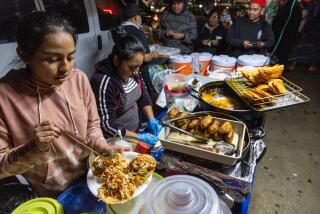WESTLAKE : Patients Repay Clinic by Sprucing It Up
- Share via
Clients of the Clinica para las Americas are often unable to pay for the medical services they receive, but several recently pitched in to spruce up the busy nonprofit clinic, which serves Westlake and Pico-Union.
Since it opened in 1990, volunteers have played an integral role in the clinic’s operation. Each day, 15 to 20 volunteers join the 17-member staff in looking after patients, handling paperwork and cleaning up.
Earlier this month, about 55 neighbors and clients joined 25 others from L.A. Works, an organization that coordinates volunteer projects throughout the city, to paint, remodel and improve the clinic’s offices at 318 S. Alvarado St.
Among the projects completed by the group was a 360-square-foot mural, designed by local artist Carol Kipling, on the clinic’s front wall. Volunteers also installed lights, built bookshelves or cooked food for the staff and those who were helping out.
Westlake resident Angelina Rodriguez was among the volunteers working on the mural. She found out about the clinic from a parent education class at her son’s elementary school.
“They’ve always treated me well here,” Rodriguez said. “I can’t always pay so I want to help in another way.”
The surge in the number of clients seen by the clinic indicates how important it is to the surrounding community. In 1990, the clinic saw 600 patients; that figure has skyrocketed to 17,000 clients a year, said Mery Gray, a member of the founding committee.
The clinic provides free and low-cost primary and preventive health care, education, and mental health services to the poor, immigrants and the homeless, said Janine Cuellar, the clinic’s chief administrator and one of its founders.
“This is a passion for most of us,” said Cuellar, who lived in Central America for several years.
Cuellar and her husband, Carlos, a doctor from El Salvador who is the clinic’s only full-time practitioner, said immigrants from war-torn countries such as El Salvador and Guatemala often have health problems complicated by stress, family separation and the lasting affects of traumatic experiences.
“I know what they’re suffering,” Carlos Cuellar said of his immigrant patients. “I’ve had the same experiences. Our major role now is to educate (our patients) to understand the importance of preventive medicine.”
Health education must take into account cultural factors and the difficulties of adjusting to life in a new country, Janine Cuellar said.
For example, some painted clay pots and home remedies for stomachaches popular among Central American immigrants contain high levels of lead, which can result in lead poisoning, she said. And parents whose children get hooked on fast food sometimes forget that traditional meals of corn tortillas, rice and beans generally contain the protein and iron needed to prevent anemia, she said.
Later this summer, the clinic will begin an anonymous screening program for anyone wishing to be tested for HIV, the AIDS virus. The clinic is also seeking doctors to volunteer at the clinic.
Funding for the clinic comes from local and state government programs as well as private sources.
Information: (213) 484-1046; (213) 484-8434.
More to Read
Sign up for Essential California
The most important California stories and recommendations in your inbox every morning.
You may occasionally receive promotional content from the Los Angeles Times.













